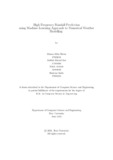High frequency rainfall prediction using machine learning approach to numerical weather modelling
Abstract
The weather has an impact on almost every aspect of our daily lives. Life would be
much easier if we could control the weather. Until then, we will have to settle for
trying to predict weather but weather prediction is very unpredictable as even a small
change in the surface and atmospheric properties can heavily impact the weather.
General weather forecasts, as we all know, are not all that accurate as they attempt
to predict the weather conditions of large areas for a large period of time as the tools
or mediums used to predict these weather conditions are not accurate enough. They
use meteorological and climate data from large areas and integrate those data into
different machine learning algorithms. Therefore these weather forecasts fail to be
accurate for smaller areas of a large city. As a result, the daily weather forecasts we
get from mobile applications or broadcasts are based on larger areas that may be less
accurate for a specific area of a city. To solve the less accurate weather prediction
problem, this research proposal focuses on constructing a model for precipitation
forecasting with the parameters such as Temperature, Wind Speed, Wind Direction,
Sea level, and Humidity which are the factors that impact the outcome at the
particular spot of interest. This study aims to present a research proposal that
combines hyper-accurate forecasts, including hour-by-hour precipitation prediction
with customisable information to the street level using supervised machine learning
algorithms, Long Short Term Memory (LSTM), Gated Recurrent Units (GRU) and
Linear Regression (LR) and feeding historical weather data from the past 40 years.
The performance of these algorithms are assessed by comparing their results with
each other to find the best algorithm suited for this research.
The test results show that the Recurrent Neural Network (RNN) models excel the
linear regression model in accuracy and indicate that RNN models can be an effective
way for weather forecasting.

